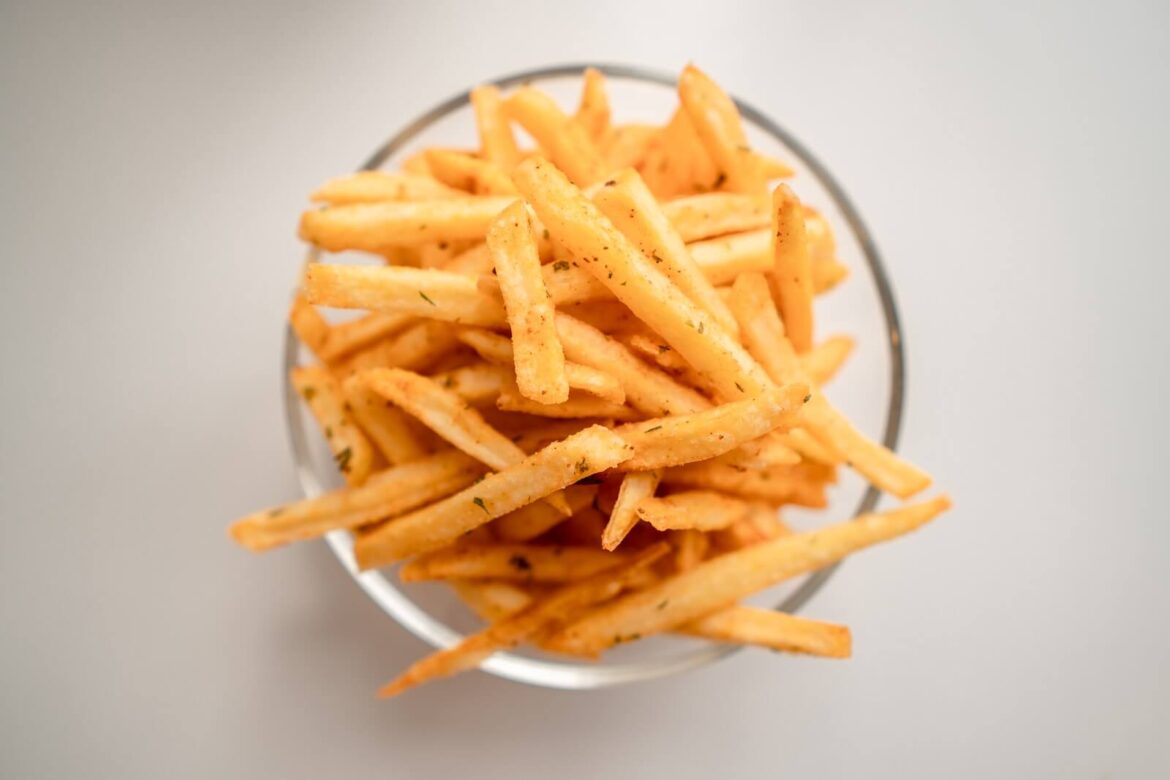
A plate of French fries (Photo by Joyce Panda on Unsplash)
In A Nutshell
French fries were associated with a 20% higher risk of type 2 diabetes for every three additional weekly servings.
Baked, boiled, or mashed potatoes showed no significant association with diabetes risk.
Replacing French fries with whole grains lowered diabetes risk by 19%.
The study was observational and primarily involved white health professionals, so findings may not apply to everyone.
BOSTON — French fries might be one of the most popular comfort foods around, but a major study provides more reason to avoid the common side dish. After tracking more than 200,000 Americans over several decades, researchers found that people who ate more French fries were more likely to develop Type 2 diabetes. In fact, just three extra servings of fries per week was linked to a 20% higher risk.
Meanwhile, no statistically significant association was found for baked, boiled, or mashed potatoes. The research, published in The BMJ, suggests while all potatoes are high in rapidly absorbed starch, the way they’re prepared appears to make a major difference.
Harvard Tracks 200,000+ Americans for Decades to Investigate Potato-Diabetes Link
Researchers analyzed dietary data from three large ongoing health studies involving over 200,000 U.S. medical professionals. Participants filled out food questionnaires every 2–4 years, allowing scientists to capture long-term eating patterns. Over 5.2 million person-years of follow-up, 22,299 participants developed Type 2 diabetes.
Most participants were White health professionals. As the paper notes, “more than 90% of our study population was of European ancestry,” which may limit generalizability to more diverse populations.
When the researchers looked at how often people ate different types of potatoes, they found a clear pattern:
People who ate five or more servings of French fries a week were much more likely to develop Type 2 diabetes.
People who ate the same amount of baked, boiled, or mashed potatoes had no meaningful increase in risk.
Even total potato intake (all types combined) was only weakly associated with diabetes risk — a 5% increase for every three extra servings a week.
 McDonalds French Fries may be irresistible for many, but research shows that just one serving of fries multiple times a week significantly raises the risk of Type 2 diabetes. (Photo by Brett Jordan on Unsplash)
McDonalds French Fries may be irresistible for many, but research shows that just one serving of fries multiple times a week significantly raises the risk of Type 2 diabetes. (Photo by Brett Jordan on Unsplash)
Swap Fries for Whole Grains, Cut Your Risk
What happens if you trade fries for healthier carbs? That’s what the researchers tested next. They found that replacing three weekly servings of French fries with whole grains, such as brown rice, quinoa, or oats, was linked to a 19% lower risk of type 2 diabetes.
Even swapping baked or mashed potatoes for whole grains helped a little, cutting the risk by about 4%. Replacing potatoes with legumes or non-starchy vegetables also helped. But one swap actually made things worse: white rice
Potatoes naturally contain fast-digesting starch, which can cause blood sugar spikes. But frying them adds fat and may create unhealthy chemical compounds.
People who ate more fries also tended to gain weight, and that likely played a role. In fact, the researchers estimated that about half the link between fries and diabetes was explained by weight gain.
Still, the study can’t say for sure that fries directly cause diabetes. It’s based on long-term observations, not a controlled experiment. Other lifestyle factors could also be involved.
To double-check their findings, the researchers combined their results with 13 other similar studies. That larger analysis, involving nearly 600,000 people, found a similar link: eating more fried potatoes was associated with a 16% higher risk of developing diabetes.
Bottom Line: Avoid Frying Your Potatoes
This study doesn’t mean you need to swear off potatoes entirely. It just reinforces a familiar idea: how you prepare your food matters.
French fries were consistently linked to higher diabetes risk. But baked, boiled, or mashed potatoes showed no significant effect. And swapping fries for whole grains or veggies could make a real difference for your health.
Disclaimer: This article summarizes findings from an observational study and does not constitute medical advice. The study shows associations, not causation. Always consult a healthcare provider before making changes to your diet or diabetes risk management.
Paper Summary
Methodology
Researchers analyzed dietary and health data from three long-running U.S. cohort studies involving 205,107 health professionals. Food intake was self-reported every 2–4 years. The team examined how total potato intake—and specific types like French fries—correlated with the development of type 2 diabetes. They also conducted substitution models and a meta-analysis of 13 additional cohort studies.
Results
French fry intake was associated with a 20% increase in diabetes risk for every three weekly servings. Total potato intake was linked to a 5% increase per three servings, while baked, boiled, or mashed potatoes were not significantly associated with diabetes risk. Substitution analysis found the greatest benefit when French fries were replaced with whole grains, cutting diabetes risk by 19%.
Limitations
More than 90% of participants were white health professionals, limiting generalizability. The study was observational, so it cannot establish causality. Preparation differences among non-fried potatoes and additions like butter or cream were not accounted for.
Funding and Disclosures
Funded by the U.S. National Institutes of Health, Friends of FACES/Kids Connect, UK Medical Research Council, Kuwait Heart Foundation, and UK NIHR. The authors reported no competing financial interests.
Publication Details
Title: Total and specific potato intake and risk of type 2 diabetes: results from three US cohort studies and a substitution meta-analysis of prospective cohorts
Authors: Seyed Mohammad Mousavi, Xiao Gu, Fumiaki Imamura, et al.
Journal: BMJ
DOI: 10.1136/bmj-2024-082121


Dining and Cooking